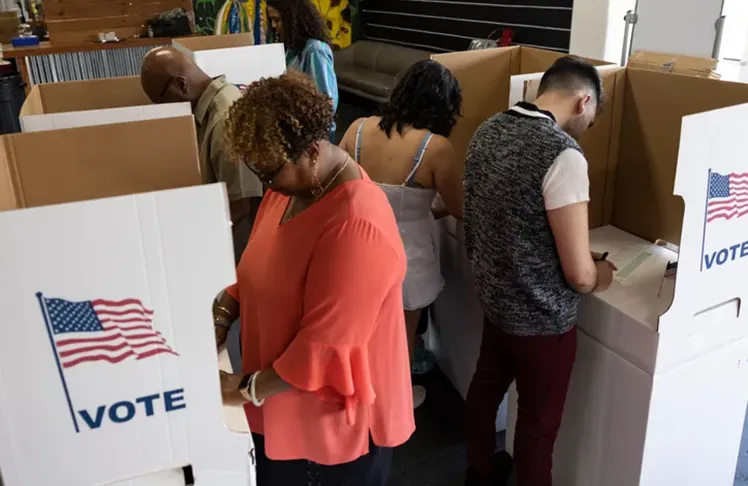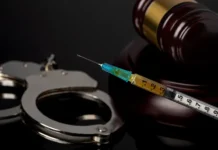
For decades, voting for president every four years was as easy and safe as picking up a loaf of bread from the supermarket: show up to the polls, cast your ballot, and move on with the rest of your day. Then, the 2020 election happened.
There were lies about election fraud and strict voter ID laws some say are racist. Vigilante “poll monitors,” some of them armed, menaced voters and poll workers, often in Black communities. Intimidating new rules that all but declare a blue vote in a red state may not be counted.
It’s enough to make a faithful voter wish for divine intervention. Faiths United to Save Democracy, however, could be the next best thing.
A nonpartisan, multi-racial, interfaith organization, FUSD is an organization designed to help and protect voters on Election Day. It dispatches trained, non-partisan volunteers — poll chaplains — to help ensure free and unhindered access to the polls for members of vulnerable communities.
Armed With the Law
Together with “peacekeepers” — lay volunteers trained with the chaplains — they support voters, explain the rules or help them report irregularities, including electioneering, harassment and intimidation. The goal: help people navigate rules that could make it more difficult for Black people, young people, the elderly and differently abled to cast a ballot and have it count.
FUSD’s voter protection campaigns this year will take place in the South, including Alabama, Florida and Texas, along with Ohio and several key swing states: Arizona, Georgia, Michigan, North Carolina, Pennsylvania and Wisconsin.
The organization was created in the wake of the 2020 election to “protect the sacred freedom to vote of vulnerable citizens” because of “wide acceptance of political violence and the increase in anti-voting laws,” Dr. Barbara Williams-Skinner, a clergywoman and activist, said in a letter to new team members.
“We’re going to watch and pray that there be no intimidation, no obstruction, and no challenges.We just want to keep the peace.” – Reginald T. Jackson
Amen, says Bishop Reginald T. Jackson, pastor of the Second Episcopal District of the AME Church in Washington, D.C.
“We’re going to watch and pray that there be no intimidation, no obstruction, and no challenges,” he says. “We just want to keep the peace. We are 100% non-partisan in nature.”
With early voting already underway in more than a few states, Faith United to Save Democracy and partner organizations — including the NAACP, Latino Christian National Network, the National Council of Churches, Religious Action Center of Reform Judaism, and the Nation’s Mosque — have dispatched some of the peacekeepers and poll chaplains they’ve trained since summer.
While some right-wing poll watchers show up with loaded guns, the FUSD teams are armed only with knowledge of election rules and laws, nonviolent intervention tactics, a voting-rights hotline, and, of course, prayer. The need for peacekeepers and poll chaplains is clear, according to an FUSD press release.
Fighting Chaos with Witness
Since the 2020 election, “voters have faced increasing barriers to exercising their right to vote,” according to the statement. “Nearly 400 voter restriction measures in 49 states, from ID laws to limited access to mail voting, have been proposed or passed. These laws erect barriers that disproportionately limit people of color, the elderly, and the poor from being able to vote.”
At the same time, “increasingly violent rhetoric and events throughout the 2024 election,” including election fraud conspiracies and death threats to poll workers, “has given voters credible concern about violence or intimidation at the polls,” according to the statement.
To counter those developments, “trained poll chaplains and peacekeepers will be deployed to cities and polling sites in areas of greatest need in this critical time for the future of our democracy,” according to the FUSD statement.
Though trained together, peacekeepers will be inside polling places as helpers while poll chaplains will stand outside to assist voters as needed. The task is simple, says Dr. James Perkins, pastor emeritus of Detroit’s Greater Christ Baptist Church.
“Be on time, let your presence be known, and be helpful as needed,” he says. “And keep the number of the [voter intimidation reporting] hotline handy, just in case it’s needed.”
“The involvement of poll chaplains and Peacekeepers is essential in actively safeguarding the vote in local communities,” says Rev. Moya Harris, director of racial justice at Sojourners, a faith-based social justice nonprofit and FUSD member. “This is integral to our call as people of faith — to combat chaos with love and witness.”















